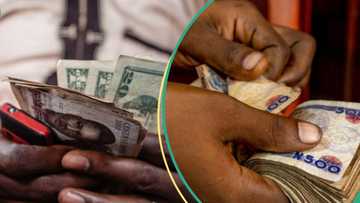"Prices of Things Will be Higher": Manufacturers Warn as Naira Falls to N1,500/$ in Parallel Market
- Prices of goods in the market are set to shoot up, according to Manufacturers Association of Nigeria
- This is as the naira continues its free fall against the US dollar in both the official and unofficial markets
- MAN said that the recurrent fluctuations in the forex market pose challenges for manufacturers in formulating long-term plans
Legit.ng journalist Victor Enengedi has over a decade's experience covering Energy, MSMEs, Technology and the stock market.
Manufacturers anticipate a further increase in commodity prices of goods in the markets across Nigeria due to the ongoing depreciation of the naira against the United States dollar.
Following the removal of the rate cap on the national currency by the Central Bank of Nigeria in June 2023, the naira has experienced a notable decline on both the official and unofficial foreign exchange platforms.

Read also
N1,490/$: Foreign airlines counter CBN's claim of concluding payment of unpaid ticket revenues

Source: UGC
At the Nigerian Autonomous Foreign Exchange Market (NAFEM), where forex is officially traded, the naira sustained its downward trend, falling to a record low of N1,348.63 per dollar.
The naira's depreciation persisted in the parallel market, with the United States dollar reaching N1506/$ yesterday, compared to the previous day's rate of N1,410.
This decline occurred despite the CBN releasing $500 million to address the backlog of verified foreign exchange (forex) transactions across various sectors.
Continuous naira depreciation leads to price escalations
Francis Meshioye, the President of the Manufacturers Association of Nigeria, told The PUNCH that the persistent value of the naira above N1,400 in the parallel market would likely result in economic repercussions, leading to price escalations.
He said:
“It is not possible to remain profitable with this exchange rate. The first challenge is breaking even. It means the prices of things will be higher, and the income is not there for people to buy things as they should buy as things become more expensive.

Read also
Naira falls to lowest in history in official market, surpasses black market at N1,460 per dollar
“So, the demand will become low, and this will affect our bottom-line. The break-even point will become critical. So, what businesses should do is to ensure that they break even at this time. It is a critical and very challenging time for us.”
Meshioye anticipates that consumers whose purchasing ability has consistently diminished are unlikely to welcome these price increases.
He noted that the recurrent fluctuations in the foreign exchange market pose challenges for manufacturers in formulating long-term plans.
He stated:
“It is a harsh time, which means we have to revise our strategy. It is hard for us to have a long-term plan, and even the short-term plans, we have to regularly revise them so that we can incorporate the reality of the economy into it.”
The president of MAN emphasized the necessity for manufacturers to collaborate and devise practical solutions to sustain their operations in light of the prevailing foreign exchange (FX) challenges.

Read also
CBN sends strong message to FX dealer as Naira hit lowest level against US dollar at official market
The depreciation of the naira has contributed significantly to the country's elevated inflation rates, which clocked at 28.92% in December, according to the National Bureau of Statistics.
Despite the Central Bank of Nigeria (CBN) persistently making multiple instalment payments to address outstanding forex backlogs, these efforts have proven insufficient to mitigate the ongoing crisis.
Also speaking on the subject is Chima Ugonna, CEO of Sterling Manufacturing. He said that the continued imbalance between the naira and the dollar makes it difficult for manufacturers to sustain low prices.
He said:
We have to import materials for manufacturing and it becomes more difficult when the dollar keeps rising against the naira. For manufacturers to stay in business, there have to be some significant price surges. I know it is difficult for consumers to under this, but that is the state of the economy that we have found ourselves today.
ABCON finally exposes reasons behind naira depreciation
Meanwhile, Legit.ng reported that Bureau de Change operators have raised alarm that some Nigerians are hoarding their savings in the US dollar due to the depreciation in the value of the naira.
The National President of the Association of Bureau de Change Operators of Nigeria (ABCON), Aminu Gwadabe, said that there was a need for the FX market to be liquid.
The ABCON boss noted that the $2.2 billion released by Afrexim Bank was insufficient to stimulate the market and significantly impact naira's value.
PAY ATTENTION: Unlock the best of Legit.ng on Pinterest! Subscribe now and get your daily inspiration!
Source: Legit.ng


